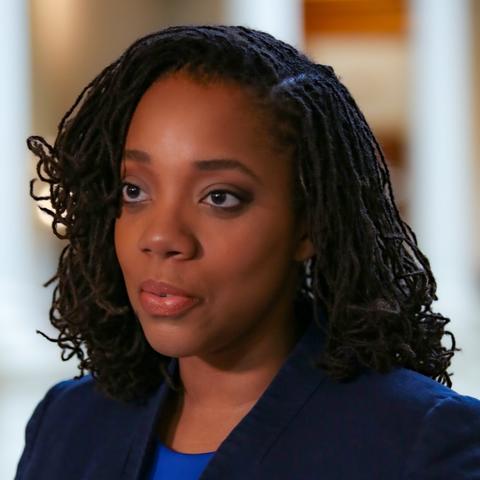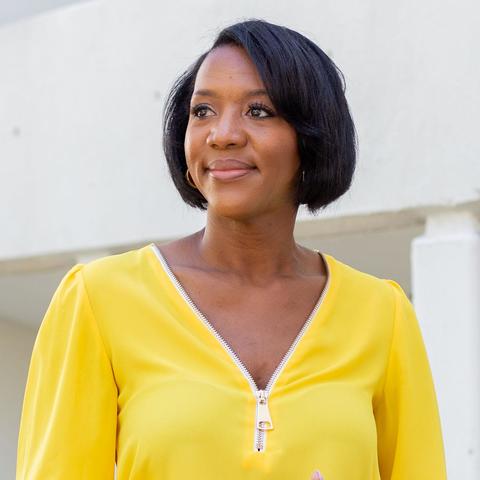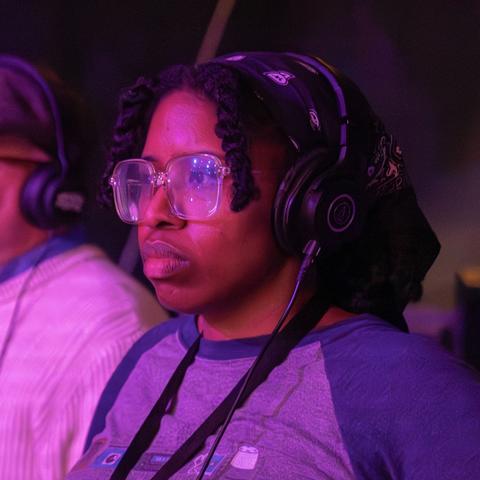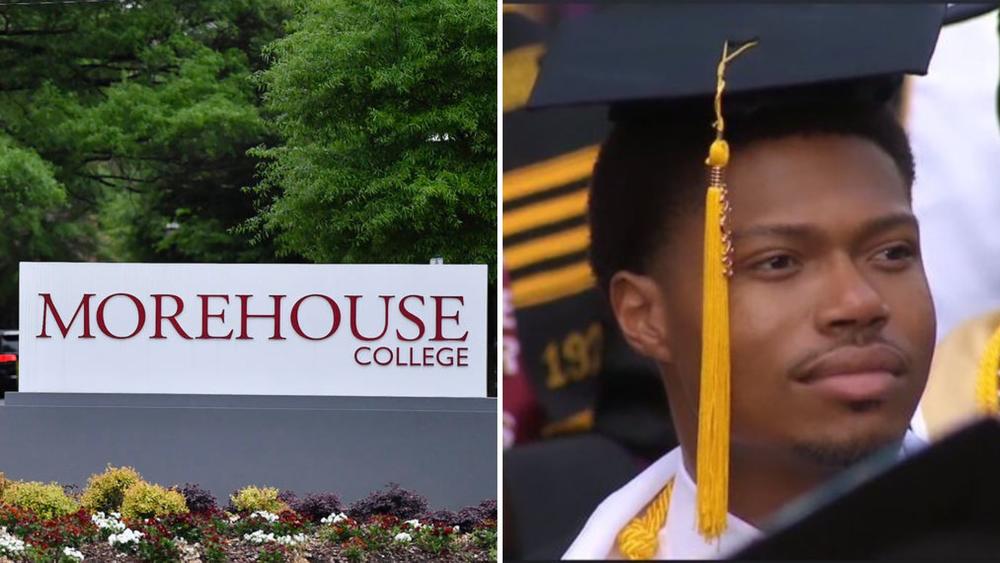
Section Branding
Header Content
First journalism grad at Morehouse College hopes program can advance newsroom representation
Primary Content
LISTEN: Leah Fleming talks to Jalen Brown, the first graduate of Morehouse College's journalism major program, and his professor, award-winning journalist Nicole Carr.

Six percent.
That’s the slice of the pie for Black journalists in newsrooms across the country. The data comes from Pew Research, which released a study surrounding minority journalists and the beats that they cover.
Morehouse College set out to change that. The school has offered a journalism minor since 2010. But in 2021, Morehouse announced, for the first time, that it would offer a 30-credit journalism major focused on Sports, Culture, and Social Justice, which Ron Thomas runs.
The new major became available after Michael Jordan and Jordan Brand made a $1 million donation to Morehouse College in May 2021 as part of the Black Community Commitment program.
Here with Leah Fleming to talk more about the program are its first graduate Jalen Brown and his professor, award-winning journalist Nicole Carr.
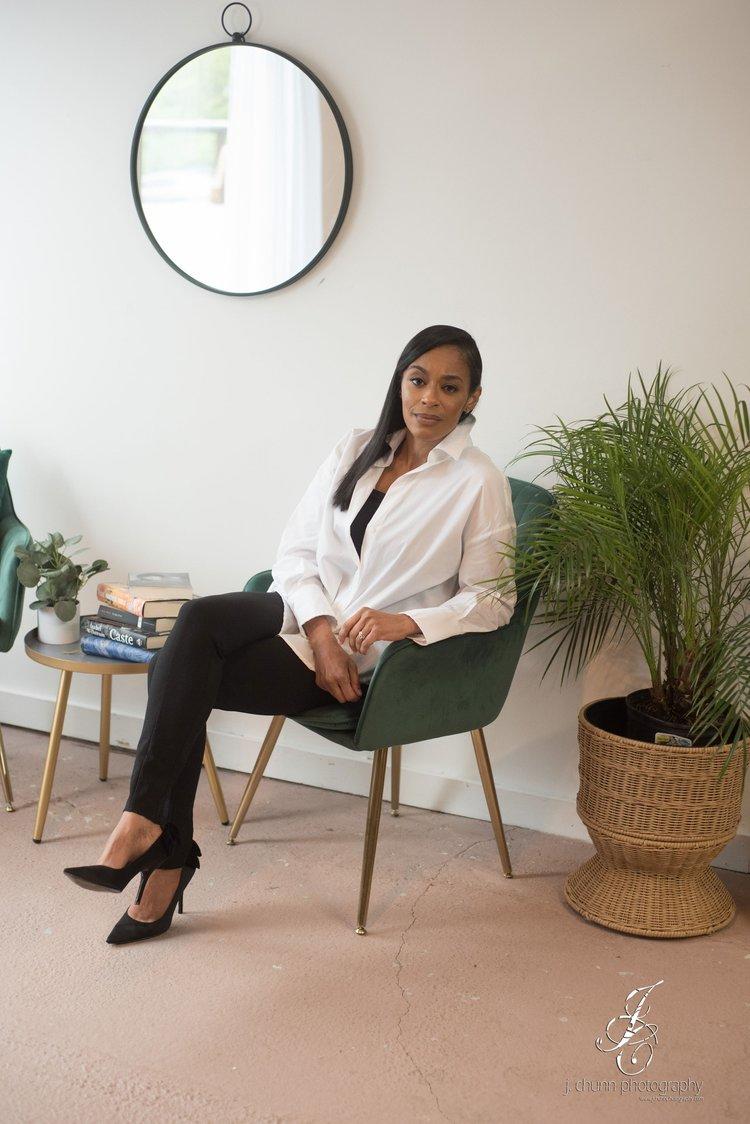
Leah Fleming: So, Jalen, our new graduate, let's start with you. What are you about to do?
Jalen Brown: Yes, I am about to work at Bloomberg Government, reporting on Capitol Hill and covering things like policy, Congress and things like that. And so I'm super excited.
Leah Fleming: Yeah, I can imagine. Nicole, you must be very proud right now.
Nicole Carr: I am. I'm cheesing. So I know no one can see us, but I am smiling from ear to ear because Jalen was in my first class two years ago when I joined Morehouse. And I immediately knew he had what it took to fill that void in the newsroom space. Not just as an excellent storyteller, but as someone asking really important questions that the time calls for us to ask in newsrooms.
Leah Fleming: Nicole, I was reading off those statistics at the beginning of this conversation. As a veteran journalist, did you actually see those gaps in the newsrooms that you've worked in, and how were you able to prepare your students for that reality, especially at an HBCU?
Nicole Carr: Yeah, absolutely. You know, I'm a product of a HBCU, and it was the professors who would — shout out to Winston-Salem State...
Leah Fleming: I was getting ready to say, "Do it!"
Nicole Carr: Right. It was the professors, particularly the practicing journalists, who came into our lives during that time, that really impacted me and made me feel like, "Hey, this is something I can pursue and a space that I really want to occupy," just like Jalen. And it started out, you know, writing for teen publications and just kind of stuck with it. I came out of 15 years in local TV news, which often does a better job of representation when you're talking about what you see on air. I'm not necessarily talking about the newsroom as a whole — but that's not always reflected in the decision makers, in the folks like you all who put the shows on air, who decide on the content, who have these really powerful roles that people don't realize exist. And so, when I got the chance to carve out time in my schedule, I said it has to be at a HBCU, because we are one of the most important pipelines.
Leah Fleming: So, Jalen, I see that you actually leveraged some internships at CNN and Bloomberg and Forbes, but I'm wondering, did that Morehouse experience — how did that really impact you going into the career that you're now going into?
Jalen Brown: I would say that being Morehouse taught me the importance of who I am and bringing that full self to a newsroom. Most of these internships that I've had have been in, like, white newsrooms. And so, like, there aren't too many people who look like me and who care about the things that I care about,—you know, just, like, people who are like me. And so Morehouse definitely taught me how to, like, bring that perspective into these spaces and to do it with no shame.
Leah Fleming: Mmm. You know, when you go in to your new experience, you may be actually one of few African-Americans. Have you thought about that?
Jalen Brown: Yes, I actually looked up the team that I'll be joining and it turns out that I will be the only Black man on that team. And, you know, that does say a lot. But I am excited to bring this perspective to somewhere important like that.
Leah Fleming: Yeah. So, Nicole, I mean, talk about how important a program like this is because, here we are in 2023 talking about Jalen's going to be the only African-American male in his department.
Nicole Carr: Yeah. And I mean, and that has traditionally been the case. But I, you know, just when Jalen was talking about this, I thought about two speakers who came into Morehouse, who are now Pulitzer Prize-winning authors from The Washington Post: Robert Samuels, Toluse Olorunnipa. And before they won the Pulitzer — this was months ahead of time, right? — they were talking about how their experience and they were two of the only Black men in the space — their experience led The Washington Post to consider how they were going to cover George Floyd. Not the incident, not the killing, with George Floyd as a person, and the humanity that went into this moment that we were discussing at the time in the summer of 2020, when the U.S. is having its so-called "racial reckoning" at the time. And they figured out a path, a journalistically sound path, that brought their perspectives and their entire being to the table to create the series that led to the book I Am George Floyd, that is now the Pulitzer Prize-winning book and will be considered a definitive record of this time. And that is because two Black men were in that process and their white male editor brought them to the table, recognizing what they brought to this story. And I tell students all the time: Bringing yourself to the story doesn't mean that you are void of facts, that you are void of the journalistic framework needed to to tell this story. But in a social justice journalism class, we — I teach that facts are non-negotiable. Framing is a choice, and framing has to do with a lens. And so if we're always telling the story through the same lens, then we miss the opportunity for a full accounting of the times.
Leah Fleming: We have been talking with Nicole Carr. She is a journalist at ProPublica. And also we have been talking with Jalen. And Jalen is a recent grad of Morehouse who is now walking into a very consequential newsroom as a journalist. And best of luck to you, Jalen, as you as you start your career.
Jalen Brown: Thank you so much. I really appreciate it. Yeah.
Leah Fleming: So students from fellow AUCC (Atlanta University Center Consortium) member institutions, Clark Atlanta University and Spelman, they can also across register to take Morehouse's — the journalism courses — as electives as well. We do want to mention that, and you can learn more about the journalism program at Morehouse.edu. And once again, we'd like to thank Jalen and Nicole for joining us.
Nicole Carr: Thank you.
Jalen Brown: Thank you. Yes.
Leah Fleming: This is GPB.
